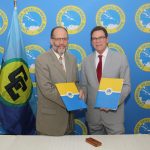CARICOM Stakeholders review Curriculum of Regional Center for youngsters with special educational needs

Children, adolescents and youth with disabilities in Guyana are currently benefiting from a Regional Centre for their stimulation.
The Regional Stimulation Center (RSC) performs the function of a disabilities/special education diagnostic facility as well as treatment centre and a training centre. The main objective of the Regional Center is to provide care for children, adolescents and youth with disabilities through the facilitation of training for teachers and caregivers.
To date, one batch of Guyanese nationals has received training from Cuban specialists. The training programme covered, among other areas, psychological and pedagogical assessments, prevention and early stimulation and the inter/multi-disciplinary approach for diagnosis and treatment of individuals. A second group is currently being trained.
While the RSC is located in Guyana, it was developed with the expectation that all CARICOM Member States would have access to the services and training offered. With this in mind, the CARICOM Secretariat hosted, on 5–6 November 2019, at its Headquarters in Guyana, a consultation with practitioners engaged in work in the field of special needs and disabilities from across the Region. The consultation was aimed at charting the way forward with respect to wider regional access to the Centre.
Specifically, the purpose of the consultation was to inform participants on the progress that has been made in relation to the establishment of the Center, engage the wider Caribbean Community working with children with special needs in examining the curriculum being used at the Center, and receive recommendations, as necessary, to ensure relevance of the services and training being offered with the wider Regional needs.
According to Meeting Organiser and Coordinator, Health and Human Development at the CARICOM Secretariat, Ms. Beverly Reynolds, the consensus at the meeting was that the initiative was needed across the Region. She said further that the programme had the potential to sensitise and equip persons who may be working in schools in practising inclusivity of all students (those with or without disabilities and special educational needs) but may not have been exposed to training for children with special education needs. The training would help teachers recognise children who may have learning disabilities and help them with planning interventions to advance the teaching–learning experience of these students.
She said that the way forward was to acquire national and or regional accreditation for the programme and outlined that a taskforce would be established to craft additions to the curriculum as recommended by the participants so that its utility to the entire Region could be enhanced.
The proposal for the establishment of a Regional Centre is a direct result of discussions at the Fourth CARICOM-Cuba Summit (2011), where the Cuban Government proposed a number of initiatives aimed at strengthening the CARICOM-Cuba programme of Cooperation. Following this, the Fifteenth Meeting of the Council for Foreign and Community Relations (COFCOR), held in Suriname (May 2012) agreed that the Government of Guyana would take the lead role in the project for the creation of the Stimulation Centre. In December 2016, the Republic of Cuba, the Cooperative Republic of Guyana and CARICOM signed a Tripartite Agreement.
Source: CARICOM TODAY

 Previous Post
Previous Post Next Post
Next Post